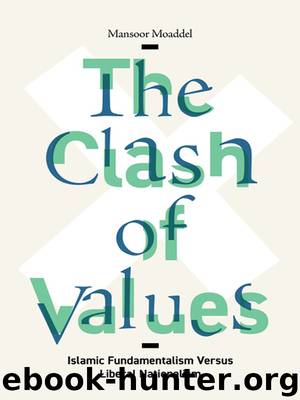The Clash of Values by Mansoor Moaddel

Author:Mansoor Moaddel
Language: eng
Format: epub
Tags: POL059000, Political Science/World/Middle Eastern, REL084000, Religion/Religion, Politics & State
Publisher: Columbia University Press
Published: 2020-02-11T00:00:00+00:00
Findings: Correlates of Religious Fundamentalism and Liberal Values
Table 4.11 shows the correlation coefficients of the measures of demographics, religion, attitudes toward sex and morality, in-group solidarity and out-group hostility, internet use, and fatalism with the indices of religious fundamentalism and liberal values. There is a consistent pattern of opposing relationships between these predictors and the indices of religious fundamentalism and liberal values across the countries, except for gender and some minor deviations for some of the other measures. A higher socioeconomic status is negatively linked to religious fundamentalism and positively linked to liberal values across all the seven countries, except among Saudi respondents, where these relationships were not statistically significant. Those in the youth bulge were also less fundamentalist and more liberal, except in Egypt, where these relationships were not significant. Finally, respondents residing in rural areas, or smaller towns in the case of Saudi Arabia, were more strongly fundamentalist and less supportive of liberal values across the countries, except that rural residence had no significant relationship with religious fundamentalism among Iraqis and no significant relationship with either index among Tunisians. All religion-related variables—religiosity, religious modernity, and trust in religious institutions—are positively linked to fundamentalism and negatively linked to liberal values. The same was true concerning the mixing of the sexes and premarital sex, except that attitudes toward the mixing of the sexes had no significant link with religious fundamentalism among Saudis and Egyptians. All the variables related to in-group solidarity and out-group hostility were linked positively to religious fundamentalism and negatively to liberal values, except that liberal values and conspiracy among Iraqis and liberal values and xenophobia among Tunisians were not significantly linked. Internet use was consistently negatively linked to religious fundamentalism and positively linked to liberal values, but the opposite was the case with fatalism, except that Saudi fundamentalists were less fatalistic.
TABLE 4.11 Correlation Coefficients for Religious Fundamentalism and Liberal Values at the Micro (Individual) Level
Download
This site does not store any files on its server. We only index and link to content provided by other sites. Please contact the content providers to delete copyright contents if any and email us, we'll remove relevant links or contents immediately.
| Arms Control | Diplomacy |
| Security | Trades & Tariffs |
| Treaties | African |
| Asian | Australian & Oceanian |
| Canadian | Caribbean & Latin American |
| European | Middle Eastern |
| Russian & Former Soviet Union |
The Secret History by Donna Tartt(19086)
The Social Justice Warrior Handbook by Lisa De Pasquale(12190)
Thirteen Reasons Why by Jay Asher(8909)
This Is How You Lose Her by Junot Diaz(6885)
Weapons of Math Destruction by Cathy O'Neil(6279)
Zero to One by Peter Thiel(5801)
Beartown by Fredrik Backman(5754)
The Myth of the Strong Leader by Archie Brown(5507)
The Fire Next Time by James Baldwin(5442)
How Democracies Die by Steven Levitsky & Daniel Ziblatt(5218)
Promise Me, Dad by Joe Biden(5153)
Stone's Rules by Roger Stone(5087)
A Higher Loyalty: Truth, Lies, and Leadership by James Comey(4960)
100 Deadly Skills by Clint Emerson(4924)
Rise and Kill First by Ronen Bergman(4788)
Secrecy World by Jake Bernstein(4752)
The David Icke Guide to the Global Conspiracy (and how to end it) by David Icke(4717)
The Farm by Tom Rob Smith(4507)
The Doomsday Machine by Daniel Ellsberg(4490)
